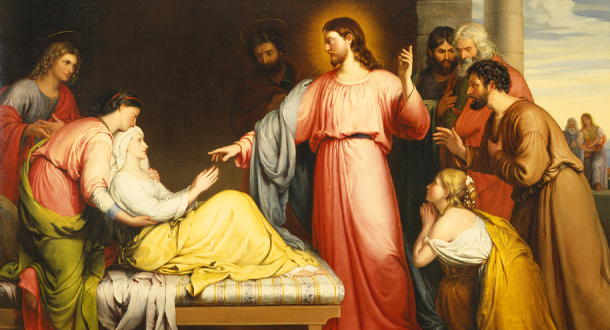
Scripture:
Reflection:
Women in the Gospel of Mark
Today’s gospel depicts Jesus healing Simon’s mother-in-law who was seriously ill with a fever.
So much is packed in this brief episode, not the least of which Jesus is honoring women by making Simon’s mother-in-law the subject of this gospel’s first miracle.
A fever may not seem serious to us today, but it was different in that pre-penicillin world. People died of fevers or the infections they caused. The mother-in-law’s illness was no minor matter.
We are told that Jesus “came and took her by the hand and raised her up. The Greek word for “raised” in the gospel is “egeiren.” Mark uses this same word when he tells of Jesus raising the Jairus’ daughter from the dead (5:41-42), and Jesus’ resurrection (14:28; 16:16). In each case, it is God’s power that makes resurrection possible.
Mark continues with the story of Simon’s mother-in-law. “The fever left her, and she served them” (vv. 31-32). One might understandably find this story offensive because of the woman’s servant role. However, Mark may be conveying a theologically rich message here. The word “served” in the Greek is “diekonei” – from “diakonia,” and from which we get the word “deacon.” The mother-in-law took up her role as deacon to the people of God in the way Jesus comes in his servant role, “not to be served but to serve” (v. 10:45), and calls his disciple to do the same.
The disciples, however, consistently fail to understand Jesus’ servant role – and theirs. Mark portrays his female followers in a far better light. At the temple, a poor widow gives more than anyone (v. 12:43). A woman who pours expensive nard on Jesus is prophetically and symbolically anointing his body for burial (14:8). When Jesus is crucified, Peter will deny him (14:72), and the other disciples will run away. Nevertheless, several women will remain present with him (15:40-41). Mary Magdalene, Mary the mother of James, and Salome will bring spices to the tomb to anoint Jesus’ body (16:1).
It is true that at the end of Mark’s Gospel, the women run away from the tomb, terrified to say anything to anyone (16:8), but we also know that announcement of the Good News, that Jesus has been raised to new life, is dependent on their witness and discipleship.
Today’s gospel with the story of Simon’s mother-in-law signals that Jesus takes women – and so many others who have been shoved to the margins of life – and call them to a special servant role in the mission and ministry of Jesus.
This is what the coming kingdom will look like. Servanthood, diakonia will be found, not in the centers of power, patriarchal and otherwise, but at the margins, among the anawim, the poor of God. In Jesus’ mission, we can catch a glimpse of the new creation and the servant role we all are exhorted to embrace. It is a role that is, time and again, given witness by the determination of the women in Mark’s gospel.
Deacon Manuel Valencia is on the staff at Mater Dolorosa Passionist Retreat Center, Sierra Madre, California.
